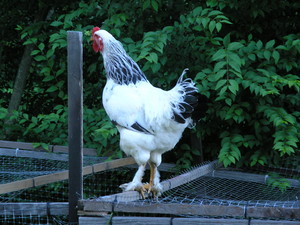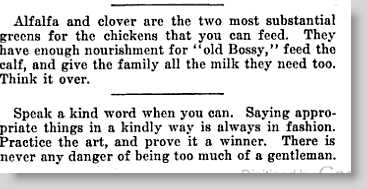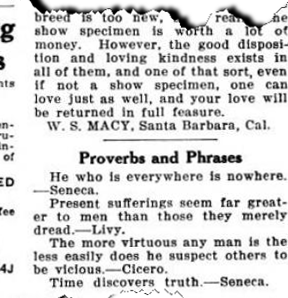28 Sep Sun 2014
Greens and Good Advice
Again the Pacific Poultryman's Magazine, January 1921.
This was a good reminder to plant the Winter Clover while it is still warm. Last year we did it far too late, around November 1st and it was brutal sowing the seeds and scratching in the dirt -- most which was almost frozen.
I got my seeds from Johnny's Seeds up in Maine and used their seed calculator too. According to the USDA hardiness tables, recently redone, we are in 5A.
Wise Advice
Good hatching Tips
Do you know why? Well having learnt the hard way: the eggs won't hatch and instead all that will happen is that the chick will DIS ...die in shell. If we can, let's avoid that. It's really a horrible thing.
Deer Ticks
The initial infection can occur with minimal or no symptoms. But many people experience a flulike primary illness or a characteristic rash several days to a few weeks following a tick bite.The flulike illness usually occurs in the warm weather months when flu (influenza) does not occur and the red rash grows daily; this is called erythema migrans.
04 Apr Fri 2014
Brahmas Gone
It was a difficult decision because we decided to get rid of the flock of Brahmas we have -- all five of them. They were nice birds, very genial and friendly. Not one of them was ever really broody except for Loki and she was the poorest brood hen I ever saw, so from the egg laying perspective they were great layers.
Two things though for us though were problematic. The first was that they were real roamers. No one did we read this, no one ever mentioned it, but we discovered always accidentally, our Brahma girls travelling all around the neighborhood. It did not bother me at all. I felt that they were doing a good service picking up bugs from the neighbors lawns and fertilizing them as they go, but the neighbors did not like it. In fact one neighbor complained mightily about Loki and her little flock -- she always travelled the team that she had raised, mainly Brahma hens like herself -- "soiling" her lawn.
I thought that funny because before I bought the birds, I had paid good money for fertilizer to nourish my vegetables and to be honest that was the one thing that I was rather suspicious about -- the girls picking up chemicals from other yards -- but this woman did not like it, so we put up a fence.
The fence has worked remarkably well but the Brahmas did not care for it and the minute there was a breach they would run for it and next thing I knew they were everywhere. Herding them back was also problematic -- they could hide well so sometimes I had to go out with broom and torch searching for them.
The second thing that gave the Brahmas their death knell was their being upgraded by the Livestock Conservancy from "Threatened" to "Watch."
The Livestock Conservancy, one of the many poultry outfits for the preservation of "heritage" breeds, tracks how well each breed does each year as they recover from the years of agribusiness manipulation to create the best layer breed ever. This has caused great changes in each breed, mainly in their ability to deal with strong weather conditions like we had this past winter (the Brahma girls were champs btw) as well as their ability to reproduce naturally -- most production girls are artificially inseminated and so many breeds have very low natural reproduction rates.
So we decided if we could, to sell the Brahmas as an unit. I really did not want to break the five of them up unless I was forced to, and luckily a good family from Binghamton came down on a sunny day and carted them away. Still I miss them, they were so sweet.
21 Jul Sun 2013
The French Say No to GMOs
One anti-genetically-modified-food poster in France shows a man with his eyes shut tight, his mouth pursed, a gun pressed to his temple. It is made of an ear of GMO corn.

This isn’t new in France. They have been locked in a battle with the European Union since 2008, when the EU food safety authority ruled that there was no “specific” scientific evidence that genetically modified crops were unsafe.
The French were up in arms and many French environmental activists routinely destroy genetically modified foods imported and used for animal feed. An example is last November,, 100 protesters climbed a grain silo and poured the highly toxic RICIN oil over the GMO soy feed.
Ricin is from the castor oil plant and is a highly toxic, naturally occurring protein. A dose as small as a few grains of salt can kill an adult human. Oral exposure to ricin is far less toxic and a lethal dose can be up to 20–30 milligrams per kilogram.
I think that's rather extreme and don't support the destruction of private property though it should be noted that there are some US-based bioterrorists like the Osho group in Oregon as well.
Rin Tin Tin, the Book Review
WE had a German Shepherd but she died. Still having grown up with them I enjoyed this book review very much. I really liked the 2nd paragraph that says "there is something uniquely noble...about the look of the German shepherd dog". Yes I have found that to be true. They are loyal creatures...and to some degree we have seen that with our chickens.
The roosters are like guard dogs, telling us about intruders (namely the construction workers and the mailman), warning us of predators (a raccoon) and not really wandering all over the place -- though one did once, apparently having gotten lost, but his Speckled Brothers called him home. So I would have to say, the chook is a poor man's watchdog.

from the Economist
Bees Save America
This fictional story was originally written for a publication called The Sunday School Advocate and was reprinted in the September, 1917 issue of the American Bee Journal.
It has since been reprinted by several authors in articles detailing the history of American beekeeping.
While obviously a fictional account of how our honey bees "Saved America," it
makes for entertaining reading for this 4th of July weekend. Enjoy!

The brave patriots of the American Revolution were having a particularly hard time of it in the summer of 1780. General Washington and his ragged, half-starved soldiers were in camp just outside of Philadelphia, where it was certain that the enemy was getting ready to make an important move.
Man after man had risked his life trying to get their secret, but so far no one had been able to give Washington the important news without which he dared not risk his small force in battle.
But the great Washington, himself, scarcely took the independence of the colonists more seriously to heart than did little Mistress Charity Crabtree. Despite her prim Quaker ways, no eyes could spark with greater fire at the mention of freedom than those that smiled so demurely above her white neckerchief and plain gray, dress.
Charity was a soldier’s daughter, and though his patriotism made her and her brother John orphans, when the boy also left to fight for his flag, Charity did not shed a tear, but handed him his sword and waved him godspeed. Though she was all alone now and only twelve years old, the little maid kept a stout heart.
“If I hold myself ready to serve my country, I know the time will come,” she said, as she walked back from the gate through the fragrant lane, honeycombed with beehives. “Meanwhile, I must keep my bees in good order.”
Charity’s father had bee a bee farmer, and he kept all these hives at the entrance of his lane, so the bees could search the highway for wildflower sweets. One of his last acts was to send a beautiful comb of their honey to General Washington, where-upon the General had smacked his lips and said: “Those bees must be real patriots. They give the best that is in them to their country.”
Charity stopped now to notice how well the bees were swarming. They seemed particularly active this morning, but she was not afraid of these little creatures who do not sting unless they are frightened or attacked.
“I shall have a great many pots of honey to sell this fall,” she thought. “It is good Providence who inspires the bees to help me keep our little white house all by myself, until brother John returns.”
Then suddenly the little Quaker maid turned pale. She stopped for a second with her hand to her ear, and then she ran quickly to the highway. These were terrible times, when, at any moment, bullets might whizz about like hailstones, and every good colonist lived tensely, in fear the little American army would be captured and their brave fight for independence lost forever.
It was a man in citizen’s dress who galloped down the road. His hat was blown off and he pressed his left hand to his side. When he saw Charity he just was able to rein in his horse and, falling from his saddle, draw her close so she might catch the feeble words he muttered between groans.
“You are Patriot Crabtree’s daughter?” he murmured, and the girl nodded, as she raised his head on her arm.
“I am shot, I am wounded,” he gasped. “Leave me here, but fly on my horse yonder to General Washington’s camp. Give him this message: ‘Durwent says Cornwallis will attack Monday with large army.
’ Do not fail him!” cried the man. “Be off at once! The enemy is pursuing close.”
Poor Charity had just time to repeat the message and assist the fainting man to a grassy place under the elm tree’s shade, when the air thundered with a thudding of hoof beats, and before the terrified girl could gain her horse, a dozen soldiers leaped over the garden wall at the back of the house.
“For my country!” the plucky maid cried, and leaped to the saddle. But even then she realized that if once the British saw her they could easily remount their own horses, evidently left on the other side of the wall, and so capture her and prevent her from reaching Washington. As it was they discovered the unconscious soldier, whom they quickly surrounded by a guard, then spied the fleeing girl and immediately gave chase.
“Ho, there!” they cried. “Stop, girl, or by heaven we’ll make you!”
They crowded after her into the mouth of the lane, while Charity cast about hopelessly for some way of escape. Suddenly, with the entrance of the soldiers, the bees began to buzz with a cannon’s roar, as if to say, “Here we are, Charity! Didn’t Washington say we were patriots, too? Just give us a chance to defend our country!”
Like lightning, now, Charity bent from her saddle, and seizing a stout stick, she wheeled around to the outer side of the hedge that protected the hives like a low wall. Then, with a smart blow, she beat each hive until the bees clouded the air. Realizing from experience that bees always follow the thing that hits them rather than the person who directs it, she threw the stick full force at her pursuers.
As Charity galloped off at high speed she heard the shouts of fury from the soldiers, who fought madly against the bees. And, of course, the harder they fought, the harder they were stung. If they had been armed with swords the brave bees could not have kept the enemy more magnificently at bay.
While Charity was riding furiously miles away, down the pike, past the bridge, over the hill, right into Washington’s camp, her would-be pursuers lay limply in the dust—their noses swollen like powder horns. When the little maid finally gained admission to Washington’s tent, for to none other would she trust her secret, the great general stared at her gray dress torn to ribbons, her kerchief draggled with mud and her gold hair loosened by the wind. But Charity had no time for ceremony.
“I have a message for thee, sir,” she said, standing erect as a soldier beside the general’s table. “I have ridden these many miles while a dozen of the enemy have been kept at bay so I might bear it.”
When she gave Washington the message he sprang from his seat and laid his fatherly hand upon her shoulder.“
The little Quaker maid has saved us,” he said, and his voice rang while he looked deep into her gray eyes, lighted with honest loyalty.
“I brought the message only as I was directed, sir,” she said. “It was my bees that saved their country.” You can imagine Washington’s surprise and that of his officers who crowded in with warm praise for the girl, when Charity told them of the story of the patriot bees.Washington laughed.
“It is well done, Little Miss Crabtree,” he cried, warmly.
“Neither you nor your bees shall be forgotten when our country is at peace again. It was the cackling geese that saved Rome, but the bees save America.”
Related articles
- Some interesting facts about bees (interflora.co.uk)
- Bee Curious (familyhypnosiscenter.wordpress.com)
Free Sample of BioNutrients
I received in the mail a coupon for a free sample of BioNutrients AG 8-1-9 which is for grass and such. I went to their website and it seems it is totally organic. While I got the flyer, anyone can ask as well.
I guess I will, as reading the information about the product one 8 oz packet covers an acre which is good.
07 Mar Thu 2013
WebRing
22 Feb Fri 2013
Weather
Today was actually rather warm; we broke freezing and despite the snow on the ground and the chill in the air, there was a rather balmy feel to the place. Of course once the sun set, all of that changed and snow began to trickle down again, but during the day, while the sun shone, it was a bright and cheerful.
Yesterday OTOH was a horror. It was cold, extremely windy and while the sun was bright and shone, one step out of the house led to a quick retreat homeward. The only one that I could see actually enjoying the weather was our winter lover, Gusto, the family Borzoi. He stood on the hill, sniffed the wind and looked eagerly about for passerbys. None of course were to be found and he seemed somewhat found.
When it is windy, like yesterday, even the cockerels won't really walk about. They hover towards to the hen house and look leeward for respite. The hens though seem not to care and yell and squeal for release-- let me out of here. The boys seem to think, or want to believe, the girls are crying for them...ah love is in the air.





